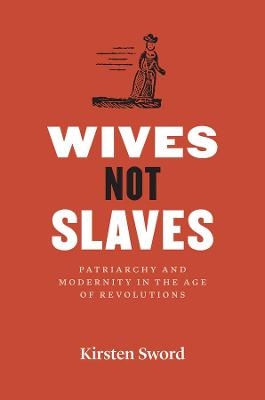
Wives Not Slaves
University of Chicago Press (Verlag)
978-0-226-75748-3 (ISBN)
Kirsten Sword’s richly researched history reconstructs the stories of wives who fled their husbands between the mid-seventeenth and early nineteenth centuries, comparing their plight with that of other runaway dependents. Wives not Slaves explores the links between local justice, the emerging press, and transatlantic political debates about marriage, slavery and imperial power. Sword traces the relationship between the distress of ordinary households, domestic unrest, and political unrest, shedding new light on the social changes imagined by eighteenth-century revolutionaries, and on the politics that determined which patriarchal forms and customs the new American nation would—and would not—abolish.
Kirsten Sword is a historian of early American and women’s history affiliated with Indiana University Bloomington.
Introduction: “If I am your Wife, I am not your Slave”
The Political Uses of Ancient Patriarchy
Divorce, Jurisdiction, and the Location of Law
Debt and the Paradox of Masculine Possessory Rights in the Age of Revolutions
1. The Trials of Christopher and Elizabeth Lawson: An Introduction to Post-Reformation Debates about Marriage
The Puritan Context of the Lawson Marriage
Arguments for Separation and Divorce
Weighing the Charges: Credibility, Economic Misconduct, Sexual Crime, Racial Boundaries, and SlanderLaw’s Irresolution
2. Submit or Starve: Manby v. Scott and the Making of a Precedent
Dynastic Marriage and Family Politics
Divorce in Interregnum England
Manby v. Scott and the Domestication of Politics
Making a Precedent
3. The Runaway Press Runaway Slaves and Servants and the Development of Colonial Labor Systems
Wayward Wives, Colonial Law, and a Shift in Practice
The Rise of the Press
4. Marriage, Slavery, and Anglo-Imperial Jurisdictional Politics
Disorder in the Legal System: Common Law, Equity, and Ecclesiastical Jurisdiction
Colonial Household Conflicts, Local Law, and the Shadow of Imperial Norms in the 1720s
Ancient Patriarchy and the Invention of “Possessory Rights”
Repercussions of Imperial Intervention in Marriage Law
The Rise of Blackstone
The Echo Chamber of the 1760s
5. A Matter of Credit: Husbands’ Claims
“Lest she should run me in debt”: Credibility and Masculine Vulnerability
“Behaved in a very unbecoming manner . . . and has eloped from me”: Implied Sexual Scandal
“Some debates that have subsisted between us”: Domestic Violence
“Will not be persuaded, either by me or her best friends, to return”: Preempting the Law
“To her usual place of abode, and to her duty”: Husbands versus Communities
6. “In Justice to my Character”: Wives’ Replies
A Change in Values or a Change in Venue? Patterns over Time and Place
Ann Wood’s Advertisement
“Endanger my life by dwelling with him”: Ann Wood’s Plea
“On the Providence of God”: Prayers and Curses
“The few remaining days of my disconsolate life”: Sentimental Dependence
Authorship, Agency, and Remedy
7. Wives Not Slaves
Liberty versus Loyalty: Marriage as Metaphor
“If I am your Wife, I am not your Slave”
“The Privilege of my Negroe Wench”
“Her service & conjugal comfort . . . which he had a right to have”
“We know better than to repeal our Masculine systems”
8. Rethinking the Revolutionary Road to Divorce
Divorce and the Jurisdictional and Personal Politics of Revolution
Divorce and Emancipation: A Useful False Equivalence
Divorce as a Woman’s Remedy: Revolutionary Expectations and the “First Families” of the United States
“Down the Stream of Time Unnoticed”: Family Secrets, Family Stories, and Legal Change
Epilogue: “The Rigour of the Old Rule”
Elizabeth Cady Stanton’s Legal Education
Manby v. Scott in the Nineteenth Century
Acknowledgments
Abbreviations and Source Notes
Notes
Index
| Erscheinungsdatum | 17.05.2021 |
|---|---|
| Reihe/Serie | American Beginnings, 1500-1900 |
| Zusatzinfo | 11 halftones, 3 tables |
| Sprache | englisch |
| Maße | 152 x 229 mm |
| Gewicht | 653 g |
| Themenwelt | Geschichte ► Allgemeine Geschichte ► Neuzeit (bis 1918) |
| Geisteswissenschaften ► Geschichte ► Regional- / Ländergeschichte | |
| Geschichte ► Teilgebiete der Geschichte ► Militärgeschichte | |
| Recht / Steuern ► Rechtsgeschichte | |
| Sozialwissenschaften ► Soziologie ► Gender Studies | |
| ISBN-10 | 0-226-75748-X / 022675748X |
| ISBN-13 | 978-0-226-75748-3 / 9780226757483 |
| Zustand | Neuware |
| Haben Sie eine Frage zum Produkt? |
aus dem Bereich


